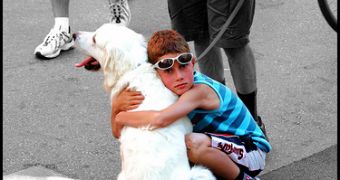A new research carried out by the University of Montreal, concluded that a dog might not be just a man's best friend, but it can also play an amazing role in the lives of children with special needs.
Sonia Lupien, senior researcher and a professor at the University of Montreal Department of Psychiatry and Director of the Center for Studies on Human Stress at Louis-H. Lafontaine Hospital, and her colleagues, measured the amount of cortisol within the saliva of autistic children, in order to detect stress levels.
In response to stress, the body produces the cortisol hormone, which peaks half-an-hour after waking up and – the cortisol awakening response (CAR), and decreases during the day, and which is also detectable in the saliva.
The research involved the measurements of the CAR in 42 children with Autism Syndrome Disorders (ASDs).
“CAR is a very useful marker of stress,”Lupien said.
“We used it to determine the effect of service dogs on the children's stress levels by measuring it in three experimental conditions: prior to and during the introduction of a service dog to the family, and after the dog was removed.”
Parents were asked to fill in a questionnaire noting the behaviors of their children before, during and after the introduction of the dog within the family.
They counted 33 problematic behaviors, on average, before the arrival of the dog, and only 25 after while living with it.
The study then concluded that specifically trained service dogs can help decrease the anxiety and enhance the socialization skills of children with ASDs.
Lupien added that these “findings showed that the dogs had a clear impact on the children's stress hormone levels.
“I have not seen such a dramatic effect before.”
Having a dog in a family with an autistic child has been considered a good thing these past decades, but this is actually the first study that has measured what the physiological impact is.
The results of the study were published this year in Psychoneuroendocrinology.

 14 DAY TRIAL //
14 DAY TRIAL //